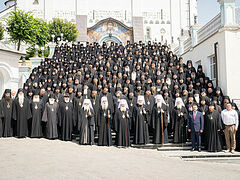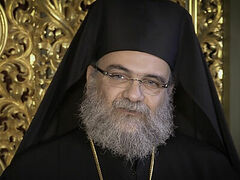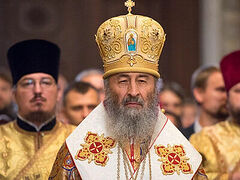Despite the change of government in Ukraine in the spring of 2019, the Ukrainian Orthodox Church (the UOC-MP) continues to feel pressure from the central authorities, and remains a target of propaganda attacks. According to information that was made public by head of the NGO “Public Advocacy” Oleg Denisov, between 2015 and 2018 about 700 negative articles about the UOC-MP appeared in Ukrainian media. The anti-Church laws of 2018–2019 are still in force, placing the UOC-MP under obligation to change its name (supposedly indicating its relationship to an “aggressor state”) and defining the procedure of “changing its jurisdiction.” However, even the new statutory provisions are not mandatory for anti-Church raiders: churches of the UOC-MP are regularly seized and transferred to another jurisdiction without compliance with any laws, simply at the request of “public” and local authorities.
But even in the current situation, the UOC-MP remains the largest Church in Ukraine. We talked with Metropolitan Kliment (Vecherya), Chairman of the Educational Committee and the Synodal Information and Educational Department, editor-in-chief of the UOC-MP’s official website and the ruling hierarch of the Diocese of Nizhyn and Priluki, on how one must live and act under the difficult conditions existing in his country seven years after the “Euromaidan Revolution.”
 Metropolitan Kliment (Vecherya)
Metropolitan Kliment (Vecherya)
Information policy
—We monitor publications in the media and observe the media situation. But the general trends are obvious, and they don’t surprise us. In Ukraine (and not only in our country), today's mass media are by no means an independent “fourth estate”. As a rule, the media is a part of business, and this business is supported by certain political processes. All this is reflected in the content of publications or TV programs. Of course, if we come across groundless accusations that entail negative consequences, we demand that this misinformation be withdrawn.
—Do you informally “rank” the media coverage of the UOC-MP—say, from “sympathetic” to “sharply negative”?
—There are some media cooperating with the UOC-MP’s Information Department—for example, the Inter TV channel. Not only do they broadcast church services, they also prepare various programs, films and interviews. At the same time, the 1 + 1 TV channel takes the opposite stance toward the UOC-MP. At one time, in every Sunday newscast they had some critical (and often false) story about our Church. It was as if that TV channel had become a sort of “Orthodox Messenger”; they were always broadcasting Church news, only with a minus sign.
But I am not surprised, since this TV channel serves the interests of one well-known person who made the struggle against the UOC-MP part of his election campaign. I have sent nine letters to the 1 + 1 channel demanding withdrawal of false information. However, I never received a single answer. When they come to us for comment, we say, “We will comment and cooperate with you if you answer at least one of our letters.” But it’s useless. If the UOC-MP doesn’t exist for them, there is no sense in cooperating with them.
—In any case, the appearance of false (and sometimes slanderous) material requires a certain response, doesn’t it?
—We try to respond, but our lawyers agree that in our country, in order to secure the withdrawal of inaccurate information you need to undertake a lot of actions. Church-related information often has a short-term value, so there is no point in seeking any withdrawal of inaccurate information, because it will at best be made public six months after the original publication. Of course, we report on any false information, especially when it involves high-profile events.
For example, several years ago, information that the UOC-MP’s synod had allegedly changed our Church’s the statutory documents suddenly “came to light.” A serious problem arose here causing negative public response. We wrote to that media outlet, asking them to withdraw the false information. There was no reply. Then we convened several press conferences to convey the necessary information... But, as I said earlier, most of the media outlets in our country are not independent. For instance, they won’t talk about how the UOC-MP helps people and distributes humanitarian aid, but will look instead for any provocative information. Cooperation with such media makes no sense. I personally don’t think that if we give more interviews or more media outlets are present at our press conferences, it will somehow improve the portrayal of our Church in the media.
—Vladyka, sometimes the media that are ill-disposed to the UOC-MP give the floor to its representatives, but sometimes add their own ideologically motivated comments to their answers. One example is the interview given to the Ukrainska Pravda newspaper by Priest Alexander Klimenko, whom the editors called the “unofficial speaker” of the UOC-MP. I was astounded by the following point in the interview: Fr. Alexander said that in the village of Pasechnaya (the Kiev region) a priest who had voiced his “pro-Russian” views in a sermon was “replaced.” Ukraine seems to have officially recognized democracy and freedom of speech. How was it that a priest was removed for his “pro-Russian” views, moreover in the Church under the jurisdiction of the Moscow Patriarchate?
—Another question is how Ukrainska Pravda presented Fr. Alexander’s words. I can only note that priests are not persecuted for their political opinions here. And I really doubt that a priest can be removed only because of his political statements. But in any case, I think that priests should minimize their speeches on political topics, since the task of a clergyman is to preach the Gospel, to preach about the Church of Christ. Whem the Gospel words become the focus of preaching, there will be no room for politics. Besides, now opponents of the UOC-MP are looking for any excuse to reproach us. Our clergy understand that any words they say and any careless statements can have a negative effect on a particular parish, diocese, and even the whole Church. Moreover, some professionals are working to create provocations, “leaking” some information, including in social media.
—Apparently, such informational-provocative “support” is important in order to ideologically justify seizing the UOC-MP’s churches. Judging by information from different regions of Ukraine, seizures of churches continue. Maybe more efforts are needed on the part of the UOC-MP to stop such lawlessness?
—It is obvious that the Church as an institution should do everything in its power to ensure the possibility of exercising the right to freedom of conscience for its members. This is not our whim—this is the constitutional right of Ukrainian citizens. We have relevant structures in the UOC-MP, legal services that provide assistance. There is a structure that informs European human rights organizations about what is going on. People who seize churches, violate laws, and trample on people’s fundamental rights and freedoms must clearly understand that by doing so, among other things, they tarnish the image of Ukraine on the international level.
In practical terms, as the Chairman of the Information Department and the diocese’s ruling bishop, I see that in most cases when churches were taken over, there were some nuances and problems at the level of parish life. But after such stressful situations their parish life not only survived, but considerably improved. Our faithful saw the behavior of the of the Orthodox Church of Ukraine (OCU) supporters, aggression, use of physical force, and blasphemy. And they drew the appropriate conclusions. In most places where our churches were taken from us we have already built new ones. Three small churches were seized in the Nizhyn Diocese. In a year the faithful themselves have built two new churches.
—Surprisingly, this problem arose even in the Nizhyn Diocese in the Chernigov region—far from Western Ukraine.
—After the establishment of the OCU in 2019 there was an instruction from above—local authorities had to report almost every two weeks on the number of meetings they held and the parishes that were “transferred” from the UOC-MP to the OCU. Then they took over two churches (there are 250 parishes in the diocese). Recently there was a conflict: An old hut converted into a church was taken away from us. But no one serves there because there are simply no OCU representatives locally. To come on Independence Day is not enough. You must attend every Sunday, and it is desirable that you come on Saturday evening and on the great feasts. But the OCU has never had such zealous believers.
Meanwhile, our faithful saw the difference between canonical Orthodoxy and schismatics. All this can have an unexpected effect. In one village in the Nizhyn District our church life was very weak. On one patronal feast, no one came to church. But after the OCU had taken over this church, the people were transformed. They bought a house, cleared the area, rebuilt everything and equipped the church. And now several dozen people come to the services in the UOC-MP church there—they have become much more zealous for the faith. This was wonderful event for us.
The Church and education
In Ukraine, unlike Belarus, the Orthodox Church didn’t sign any special agreements with the Ministry of Education. The reasons are clear: Until January 2019, the State had recognized three Orthodox jurisdictions (the UOC-MP, the “Kyiv Patriarchate” and the “Ukrainian Autocephalous Orthodox Church”—the UAOC). Basically, the cooperation of the Churches with the Ministry of Education was carried out through the Public Council, in which both Christian denominations and non-Christian religions are represented. On the one hand, this limited the opportunities of the UOC-MP; but on the other hand, the Ministry listened to the recommendations more closely if they were backed not only by Orthodox, but also by other denominations and faiths. Metropolitan Kliment has been a member of the Public Council at the Ministry of Education for over ten years.
—Perhaps our greatest achievement was the recognition of theological educational institutions degrees. True, this regulation was valid only until 2018. Now educational institutions can apply for state accreditation. But the political situation is such that the Synod and the Educational Committee have decided not to use this opportunity, since we may lose what we have now.
—For all that, now the recognition of degrees is being brought to the level of higher educational institutions. For example, if a student receives a bachelor's degree in theology and wants to study for a master’s degree at a secular university, this university has the right to recognize his bachelor’s degree and admit him to a master’s course.
—Good. But employers cannot “automatically” recognize such a degree. If a graduate of a theological academy wants to get a job as a teacher at a school or as an employee of the Committee for Religious Affairs, his degree won’t be recognized.
—Right. But that has both advantages and disadvantages. I have been connected with theological education for most of my life. The Church invests vast human, financial and spiritual resources in the process of theological education, hoping that there will be some fruits—but not “fruits” as in getting a job in a secular organization or leaving for Poland. A graduate of a theological educational institution must fulfil himself in the Church. When degrees are not recognized, you have to make a decision before your studies and understand your role in the Church environment. I have diplomas awarded by secular educational institutions but I don’t know where they are because I don’t really need them in my work. But I am absolutely satisfied with the diploma I received at the seminary.
—Vladyka, let me touch upon the issue of the “Fundamentals of Christian Ethics” courses taught in secondary school in Ukraine. They are optional, aren’t they?
—Yes, moral courses are included in the “variable part” of the school curriculum. That is, schools and parents are free to choose certain subjects. But there are problems. If parents opt for the subjects that contain spiritual and moral content for their children, the parents themselves often have to pay for these. In the current economic situation, this frightens away many. But our Public Council is constantly setting up new working groups for programs related to the introduction of such subjects into school curricula.
These processes are very complex, largely due to funding problems. We are now working to ensure that these subjects are included in the “invariable part” of the curriculum (the compulsory part). Even the Minister of Education said that the task of revising curricula and introducing a spiritual and moral component is on the agenda. This concerns literature, but we have also suggested physics and biology. There are still Soviet-era approaches, such as the dominance of the theory of evolution.
—I’d like to know your opinion not only as a bishop, but also as a holder of a master’s degree in biology. Do you think modern textbooks attempt to present any points of view other than Darwin’s theory?
—In my opinion, these are clumsy attempts. They talk about evolution for a whole year and then devote fifteen minutes to creationism., Nothing has changed fundamentally since the Soviet era. Students are told that the amoeba evolved into the ape in a natural way. Although if you look at the characteristic features and properties of these organisms, you will draw entirely different conclusions.
—Vladyka, how many schools in Ukraine have introduced spiritual and moral education classes into the “variable part” of the curriculum?
—I don’t have exact figures, but much depends on subjective factors and on each region in particular. If we take Western Ukraine (The Ivano-Frankivsk, Ternopil or Lviv regions), even before the adoption of the relevant laws (from the 1990s on) these subjects were compulsory, not optional. School students were allowed not to learn mathematics, but they were obliged to study the Law of God.
—In a regular high school?
—In a regular high school. However, everything there serves the interests of the Greek Catholics (Uniates). There was even such a story in Ternopil. The children (second graders) who were taught the subject “Communion” were taken to a Catholic church to receive Communion. But one boy refused: he is Orthodox and goes to our cathedral. The teacher gave him a bad grade for refusing to receive Communion in a Catholic church. Can you imagine how stressful that was for a second grader? Curiously enough, there were no consequences for the teacher. If I in Nizhyn were to force some Catholic to take Communion in an Orthodox church, half of Europe would have known about me! And this was not an isolated case...
—Over two years ago, the Ukrainian Ministry of Education developed regulations on how to present the process of the establishment of the OCU in schools. These recommendations, as I noticed after reading them, are ideologically biased and don’t take into account other opinions, including the position of the UOC-MP. Have you tried to somehow change their content?
—Yes, I have. But we have had a succession of Ministers of Education over these years, so there was no result. We talked about this with the previous minister, but he was removed. Then there was an acting minister for a long time. Now we have a new minister. He promised to amend the regulations. It is important to resolve all issues long before the start of the new school year.
To be continued…




